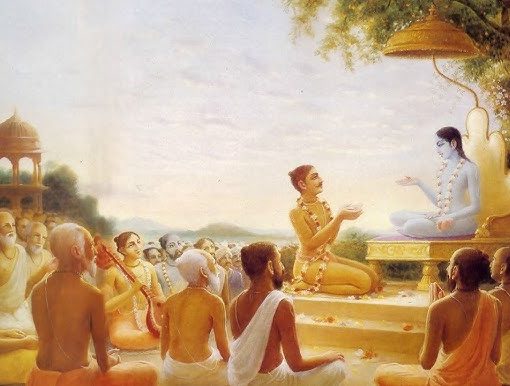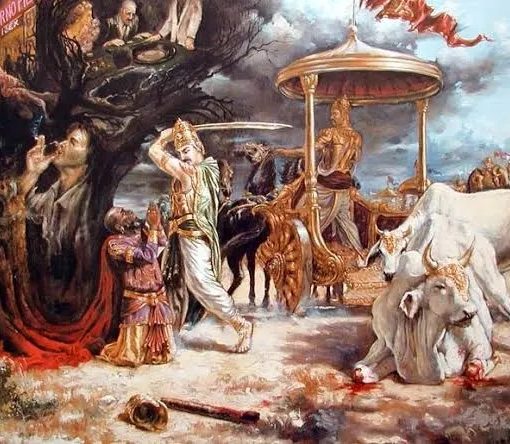The Fourteenth Chapter of the Śrīmad-Bhāgavatam is both a heart-wrenching and enlightening account of King Yudhiṣṭhira’s deepening anxiety over the well-being of Lord Krishna. It provides a glimpse into the inseparable bond between the Lord and His devotees. The chapter beautifully portrays the pure love and dependence of devotees on Krishna and serves as a lesson on dealing with unexpected calamities, the uncertainty of material life, and the paramount importance of Krishna consciousness.
The Foreshadowing of Ominous Events
The chapter begins with ominous signs appearing all around the kingdom of Hastināpura. King Yudhiṣṭhira, a devotee and the king of the Kuru dynasty, begins to sense an unsettling change in the atmosphere. The chapter describes how he sees inauspicious omens everywhere, including unusual disturbances in nature, natural calamities, and unsettling events among living beings.
Yudhiṣṭhira’s acute observation of these events illustrates his sensitivity and concern for the people of his kingdom, as well as his deep spiritual insight. The signs point to something beyond material calamity, and Yudhiṣṭhira immediately senses that these are indicators of Krishna’s absence or that something grave might have happened to Krishna. His deep love for Krishna makes him understand that such disturbances are the direct consequences of the Lord’s potential departure from the world.
Lesson:
Yudhiṣṭhira’s response teaches us the importance of vigilance and discernment in spiritual life. Devotees of Krishna must be sensitive to signs that indicate spiritual well-being or decline, not only for themselves but also for the world around them. This sensitivity stems from the awareness that Krishna is the center of everything, and any disharmony in creation reflects a lack of connection with Him.
Yudhiṣṭhira’s Growing Anxiety: A Devotee’s Heart
Yudhiṣṭhira’s anxiety is not ordinary—it is born out of his pure love for Krishna. Unlike material anxiety, which stems from attachment to the body or possessions, spiritual anxiety arises from loving attachment to the Lord. Yudhiṣṭhira’s mind is overwhelmed with thoughts of Krishna’s safety, well-being, and whereabouts. Despite being an emperor and having many responsibilities, Yudhiṣṭhira’s foremost concern is the Lord’s presence and welfare.
This intense feeling of separation from Krishna, called viraha-bhāva, is a hallmark of bhakti-yoga. The great devotees, such as the gopīs of Vrindavana, Uddhava, and now Yudhiṣṭhira, experience this divine separation as a deep spiritual ecstasy. It is through this intense longing that the devotee’s relationship with Krishna becomes more profound.
Lesson:
Yudhiṣṭhira’s anxiety reveals the essence of Krishna consciousness—the longing to be with Krishna, to serve Him, and to never be separated from Him. Devotees can draw inspiration from Yudhiṣṭhira’s yearning to cultivate a similar eagerness to be with Krishna, which is the foundation of a successful spiritual life.
Signs of Disruption: The Impact of Krishna’s Absence
Yudhiṣṭhira notices that many aspects of life have become chaotic and that moral and ethical standards seem to be diminishing. He sees unusual behavior among animals, sudden changes in weather, and negative shifts in the overall energy of the kingdom. The cows and bulls appear disturbed, the rivers flow with unnatural patterns, and even the demigods and sages seem restless. These are all clear signs of adharma—the decline of righteousness—indicating that Krishna, who is the embodiment of dharma, might no longer be present.
This passage serves as a reminder that Krishna’s presence ensures harmony, prosperity, and righteousness in society. The moment He is absent, material nature begins to revert to its chaotic state. The same principle applies to our personal lives—when we forget Krishna or neglect our spiritual practices, our lives gradually become disordered, filled with anxiety, and dominated by material desires.
Lesson:
This section emphasizes the need to maintain constant connection with Krishna through regular spiritual practices, such as chanting His holy names, studying scriptures, and engaging in devotional service. Krishna’s presence is what keeps our lives, hearts, and minds aligned with dharma, and His absence invites confusion and distress.
The Heart of Bhakti: Lamentation and Surrender
As Yudhiṣṭhira’s anxiety grows, his brothers and close associates also begin to share his concern. Bhīma, Arjuna, Nakula, Sahadeva, and Draupadī all express their worry for Krishna, and the entire royal family feels incomplete without Him. The chapter captures this poignant moment of collective lamentation, showing how Krishna’s presence is the source of joy, peace, and security for His devotees.
The lamentation experienced by Yudhiṣṭhira and the Pandavas is not a sign of weakness, but rather an expression of their intense love for Krishna. In bhakti-yoga, lamentation and tears are not seen as negative emotions; they are seen as signs of spiritual maturity and surrender. Yudhiṣṭhira’s lamentation is the heartfelt cry of a devotee who cannot bear the thought of living without Krishna.
Lesson:
The deep sorrow of the Pandavas over Krishna’s potential departure teaches us the value of surrendering to Krishna’s will, even when it is painful. As devotees, we should not be afraid to express our vulnerability before Krishna. It is this openness and honesty in our relationship with Him that strengthens our bond and deepens our bhakti.
Arjuna’s Return: The Messenger of Krishna
Towards the latter part of the chapter, Arjuna returns from Dvārakā, where he had gone to meet Krishna. However, upon his return, Arjuna’s appearance is unusual—he looks dejected, his face pale, and his body weak. Yudhiṣṭhira immediately senses that something catastrophic has happened, and he prepares himself for the worst news.
Arjuna’s condition indicates that the worst fear of the Pandavas may be true—Krishna has left the mortal world. Arjuna’s sorrow is not just personal; it is existential. He realizes that his strength, valor, and success as a warrior were never his own; they were all gifts of Krishna. With Krishna’s departure, Arjuna feels spiritually bereft, helpless, and powerless.
Lesson:
Arjuna’s realization is a powerful lesson in humility and dependence on Krishna. We often take pride in our abilities, achievements, and strengths, forgetting that they are ultimately bestowed by Krishna. Arjuna’s grief teaches us that without Krishna’s mercy, we are helpless. True spiritual realization involves acknowledging that we are always dependent on Krishna’s grace.
The Temporary Nature of the Material World
Arjuna shares with Yudhiṣṭhira the news of Krishna’s departure, and the Pandavas’ worst fears are confirmed. This devastating news plunges the entire royal family into deep sorrow. Arjuna explains how Krishna’s presence had protected them, guided them, and enabled them to achieve success. Now, with His departure, the reality of the temporary nature of the material world becomes all too evident.
Arjuna recalls the many instances when Krishna saved him from mortal danger, such as during the Battle of Kurukshetra, the burning of the Khandava forest, and his encounters with powerful demons. Krishna was not only their protector but also their friend, philosopher, and guide. His departure symbolizes the ephemeral nature of everything material, including relationships, wealth, and power.
Lesson:
This chapter’s climax drives home the stark reality that the material world is temporary, no matter how glorious or successful one’s life may appear to be. As devotees, we are reminded to cultivate detachment from material achievements and relationships, understanding that our only eternal relationship is with Krishna.
Finding Hope Amid Despair: Krishna’s Eternal Presence
Despite the grief over Krishna’s departure, the Pandavas find solace in one profound truth—Krishna is always present in the hearts of His devotees. He may have departed from the material world, but He is eternally present through His holy names, pastimes, deities, and teachings. This realization helps them transcend their immediate grief and renews their commitment to living a life dedicated to Krishna.
The Bhāgavatam emphasizes that Krishna’s presence is not limited by time, space, or circumstances. His name, form, qualities, and pastimes are non-different from Him, and by engaging in hearing, chanting, and remembering, devotees can always feel His presence.
Lesson:
This realization is incredibly encouraging for spiritual practitioners. Even in the absence of physical association, Krishna can be felt and experienced through devotional practices. When faced with loss or separation, devotees should immerse themselves in nāma-saṅkīrtana (chanting the holy names) and śravaṇa (hearing about Krishna) to regain spiritual strength.
Conclusion: Learning from King Yudhiṣṭhira’s Anxiety
The Fourteenth Chapter of the Śrīmad-Bhāgavatam is a profound meditation on spiritual love, dependence, humility, and the reality of Krishna’s eternal presence. It teaches us that true strength lies not in material power but in the grace of Krishna. It also reminds us that while the material world is temporary, our relationship with Krishna is eternal and can never be broken.
As we reflect on Yudhiṣṭhira’s anxiety, let it inspire us to deepen our connection with Krishna through regular spiritual practices. Let us not wait for calamities to turn to Him, but rather, make Krishna the center of our lives at all times. Yudhiṣṭhira’s anxiety was born out of love, not fear. Similarly, our longing for Krishna should be driven by love—a love that transcends material attachments and ultimately brings us closer to Him.
In our daily lives, let us strive to emulate the Pandavas’ unwavering devotion, humility, and dependence on Krishna, knowing that He is always there to guide, protect, and love us, even in the darkest of times.





